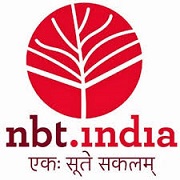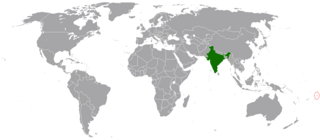Pravasi Bharatiya Divas is a celebratory day observed on 9 January by the Republic of India to mark the contribution of the overseas Indian community towards the development of India. The day commemorates the return of Mahatma Gandhi from South Africa to Mumbai on 9 January 1915.

Indian Indonesians are Indonesians whose ancestors originally came from the Indian subcontinent. Therefore, this term can be regarded as a blanket term for not only Indonesian Indian proper, but also Indonesians with other South Asian ancestry. According to the Indian Ministry of External Affairs, there were about 120,000 people of Indian origin as well as 9,000 Indian nationals living and working in Indonesia as of January 2012. Most of them were concentrated in province of North Sumatra and urban areas such as Banda Aceh, Surabaya, Medan and Jakarta. However, it is quite impossible to get correct statistical figures on the Indian Indonesian population, because some of them have merged and assimilated with the indigenous population to become indistinguishable from native Indonesians.

Indira Gandhi National Centre for the Arts (IGNCA), New Delhi is a premier government-funded arts organization in India. It is an autonomous institute under the Union Ministry of Culture.

The National Institute of Science and Technology (NIST) was established in 1996 by a group of academicians and technocrats educated in the established institutes of India and abroad. It is promoted by SM Charitable Educational Trust under the vision and guidance of its founder chairman, Dr. Sukant K. Mahapatra, PhD, Stevens Institute of Technology, NJ, USA. The institute is approved by the All India Council for Technical Education (AICTE) and is affiliated to the BPUT. The institute campus of 70 acres is located in the Pallur Hills about 12 km from Berhampur and three hours drive from Bhubaneswar.

The College of Engineering Perumon was started in 2000 under the Co-operative Academy of Professional Education Society. The society was formed to establish educational institutions to provide education and training, research and development, and consultancy. The society is promoted by the Co-operation Department of the government of Kerala and is an autonomous society.
Thomas Abraham is an Indian and is the founder president and chairman of the Global Organization for People of Indian Origin (GOPIO), having previously founded the organization and served as its president. He was the Convener of the First Global Convention of People of Indian Origin held in New York, where GOPIO was formed. Earlier, Dr. Abraham served as the executive trustee of GOPIO Foundation. He is also president of Innovative Research and Products, Inc., Stamford, CT, US, a multi-client market research firm in new generation technologies specializing in advanced materials, nanotechnology, electronic components, energy generation and storage devices, etc.

National Book Trust (NBT) is an Indian publishing house, which was founded in 1957 as an autonomous body under the Ministry of Education of the Government of India. The activities of the Trust include publishing, promotion of books and reading, promotion of Indian books abroad, assistance to authors and publishers, and promotion of children's literature. NBT publishes reading material in several Indian languages for all age-groups, including books for children and Neo-literates. They publish a monthly Newsletter about recent publications.

India–Ireland relations, also known as Irish–Indian relations or Indo-Irish relations, are the bilateral relations between India and Ireland. As former possessions of the British Empire, the two countries had a similar fight against a common adversary and there were many ties between the respective independence movements in the two countries. Many of the provisions of the constitution of India were drawn from their Irish counterpart, the Constitution of Ireland. There are also regular governmental visits. Indo-Irish relations were also strengthened by people like of Jawaharlal Nehru, Éamon de Valera, Rabindranath Tagore, W B Yeats, James Joyce, Sister Nivedita and Annie Besant.
Indianisation also known as Indianization, may refer to the spread of Indian languages, culture, diaspora, cuisines, economic reach and impact.

Bulgaria–India relations are the international relations that exist between the Republic of Bulgaria and the Republic of India.

India–New Zealand relations are the interactions between India and New Zealand. Both these countries were once part of the British Empire. There are approximately 175,000 people of Indian descent in New Zealand.

The National Youth Festival in India is an annual gathering of youth with various competitive and collaborative activities. Celebrated to commemorate the birth anniversary of youth icon Swami Vivekananda, it is organized by Ministry of Youth Affairs and Sports, Government of India in collaboration with one of the State Governments. It is held in a different state each year during National Youth Week, 12 to 16 January every year.

Overseas Indians, officially Non-Resident Indians (NRIs) and People of Indian Origin (PIOs) are Indians who reside or originate outside of India. According to the Government of India, Non-Resident Indians are citizens of India who currently are not living in India, while the term People of Indian Origin refers to people of Indian birth or ancestry who are citizens of countries other than India. Overseas Citizenship of India (OCI) is given to People of Indian Origin and to persons who are not People of Indian Origin but married to People of Indian Origin. Persons with OCI status are known as Overseas Citizens of India (OCIs). The OCI status is a permanent visa for visiting India with a foreign passport.

Overseas Citizenship of India (OCI) is a form of permanent residency available to people of Indian origin and their spouses which allows them to live and work in India indefinitely. Despite its name, OCI status is not citizenship and does not grant the right to vote in Indian elections or hold public office. The Indian government can revoke OCI status in a wide variety of circumstances. In addition, the OCI card is only valid with a valid foreign passport. As of 2020, there are 6 million holders of OCI cards among the Indian Overseas diaspora.

India–Rwanda relations are the foreign relations between the Republic of India and the Republic of Rwanda. India is represented in Rwanda through its High Commission in Kigali which opened on 15 August 2018. Rwanda has been operating its High Commission in New Delhi since 1999 and appointed its first resident High Commissioner in 2001.

Digital India is a campaign launched by the Government of India to ensure that the Government's services are made available to citizens electronically through improved online infrastructure and by increasing Internet connectivity or making the country digitally empowered in the field of technology. The initiative includes plans to connect rural areas with high-speed internet networks. It consists of three core components: the development of secure and stable digital infrastructure, delivering government services digitally, and universal digital literacy.

India-Zimbabwe relations are bilateral relations between India and Zimbabwe.

Democratic Republic of the Congo–India relations are the international relations that exist between the Democratic Republic of the Congo (DRC) and India.

Burundi–India relations are the international relations that exist between Burundi and India. Apart from bilateral relations, India also engages with Burundi through the African Union and the Regional Economic Communities (RECs).

India–Samoa relations are the international relations that exist between India and Samoa. The High Commission of India in Wellington, New Zealand, is concurrently accredited to Samoa. Samoa maintains an Honorary Consul in New Delhi.


















